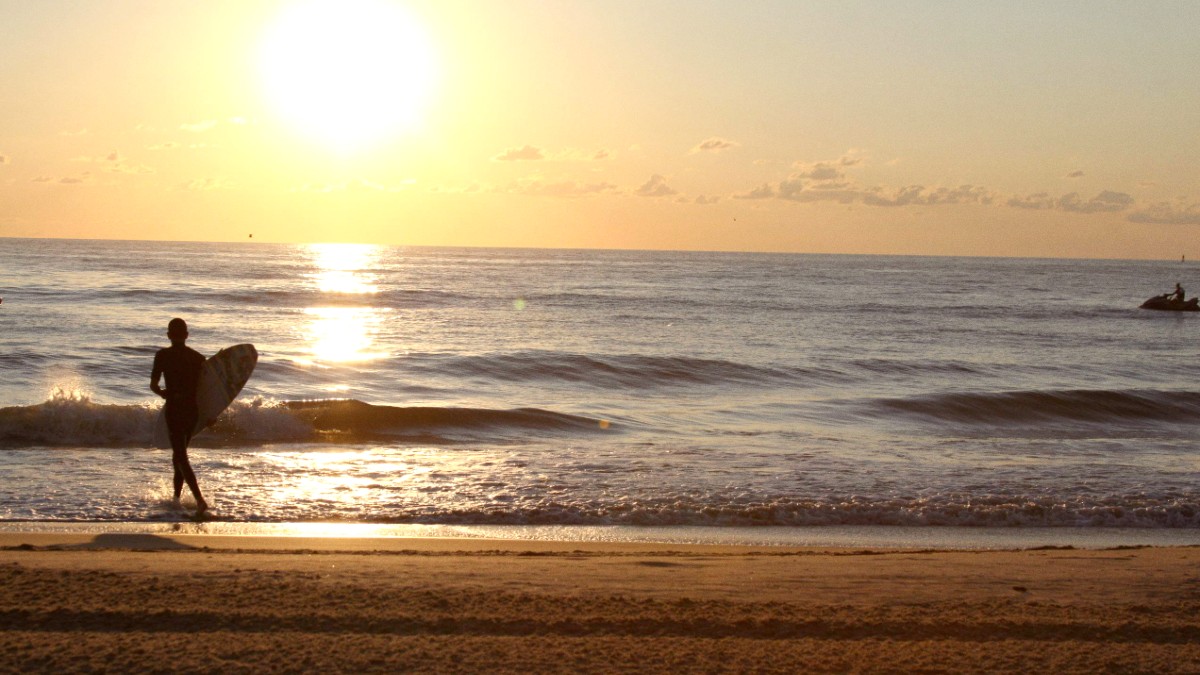
Virginia, USA
Spring (March-May): Temperatures are mild, averaging 50-70°F (10-21°C). Rainfall is moderate. Humidity rises as summer approaches. This period offers comfortable conditions for outdoor activities without intense heat.
Summer (June-August): Hot and humid conditions dominate, with averages of 75-85°F (24-29°C). Temperatures often exceed 90°F (32°C). High humidity, ranging from 60-90%, is common. Afternoon thunderstorms are frequent, often brief but intense. This is the peak beach season.
Low Season (November-March): Accommodation and flight prices are at their lowest. Fewer crowds. Good for indoor attractions, museums, and quiet beach walks.
Special Weather: Virginia Beach is susceptible to tropical storms and hurricanes, specifically from June 1st to November 30th. Peak season is mid-August to late October. Monitor forecasts and have travel insurance. Thunderstorms are common during summer afternoons, often brief but intense. They bring heavy rain and lightning.
Be aware of seasonal weather conditions.
Beach & Water Sports: June to September. Boardwalk & Outdoor Exploration: April-May and September-October.
Hurricanes: June-November. Thunderstorms: Common in summer afternoons.
Pros and cons of each travel period.
Pleasant temperatures, fewer crowds, lower prices. Ocean water remains warm in September.
Coldest weather, swimming not possible. Many beach-focused businesses close or have limited hours.
When to experience specific activities.
Biking, walking: April-May and September-October. Wildlife Viewing: Spring and Fall.
Most major events occur in summer, some in spring and fall. Whale watching gains popularity in winter.
Citizens of 40 countries can enter the U.S. For tourism or business for up to 90 days without a visa. Travelers need an approved Electronic System for Travel Authorization (ESTA). Apply for ESTA online via the official U.S. Customs and Border Protection (CBP) website. Approval often occurs quickly but may take up to 72 hours.
Citizens from countries not participating in the VWP must obtain a B-1 (business) or B-2 (tourism) visa from an U.S. Embassy or consulate abroad. This process usually involves an online application (DS-160), payment of a fee, and an in-person interview. Plan this process well in advance, as appointment wait times vary.
Your passport must be valid for at least six months beyond your planned stay. Some country-specific exemptions apply.
Present whichever document applies to your nationality.
Proof of your intent to depart the U.S.
Evidence you have enough money to cover your travel and accommodation expenses.
The address of your first night's stay is often necessary on arrival forms. Have this information ready.
Plan your budget for Virginia Beach for a comfortable trip. Costs vary depending on your travel style and the season.
The official currency is the United States Dollar (USD or $). ATMs are widely available throughout Virginia Beach. Credit cards are universally accepted. Foreign currency exchange services are limited outside major airports or banks. Exchange money before arrival or withdraw from ATMs.
Excluding major flights, here are typical daily costs:
Consider your health and safety when you visit Virginia Beach.
No specific vaccinations are necessary for entry. CDC suggests remaining up-to-date on routine vaccinations (MMR, DTP, varicella, polio, flu shot).
Summers are hot. Apply Broad-spectrum sunscreen (SPF 30+), wear a Wide-brimmed hat, and drink plenty of water. Seek shade, especially 10 AM-4 PM.
Present in natural areas. Use Insect repellent with DEET or picaridin.
Emergency Services: Dial 911 for police, fire, or medical emergencies.
Virginia Beach has modern hospitals (Sentara Virginia Beach General, Princess Anne Hospital) and urgent care centers for non-emergencies. Tap water is potable.
Jellyfish Stings: Possible in ocean waters (late summer). Lifeguards offer assistance. Rip Currents: Swim near lifeguard-protected areas. If caught, swim parallel to the shore.
Food Hygiene: Maintain good food hygiene and choose reputable dining establishments. Standards are high.
Virginia Beach is generally a safe city for tourists. The Resort Area is safe with increased police presence. Be aware of petty crime, like theft from unattended bags or car break-ins.
Hurricanes/Tropical Storms are a risk from June to November. Heed evacuation orders. Nor'easters (winter storms) bring rain, snow, coastal flooding. Thunderstorms occur year-round; seek indoor shelter.
Police (non-emergency): (757) 385-5000. U.S. Coast Guard (maritime emergencies): (757) 483-8567 for Sector Hampton Roads. Keep your country's embassy or consulate contact info ready.
Be aware of ocean conditions. Swim near lifeguard-protected areas. If caught in a rip current, swim parallel to the shore until you can break free, then swim to shore. Do not fight the current by swimming directly against it.
Secure your valuables, especially on the beach and in parking lots, to deter theft.
Keep bags attended. Do not leave valuables visible in vehicles.
Avoid walking alone at night in poorly lit areas. Secure your valuables.
Ensure car doors are locked. Do not leave items in plain sight.